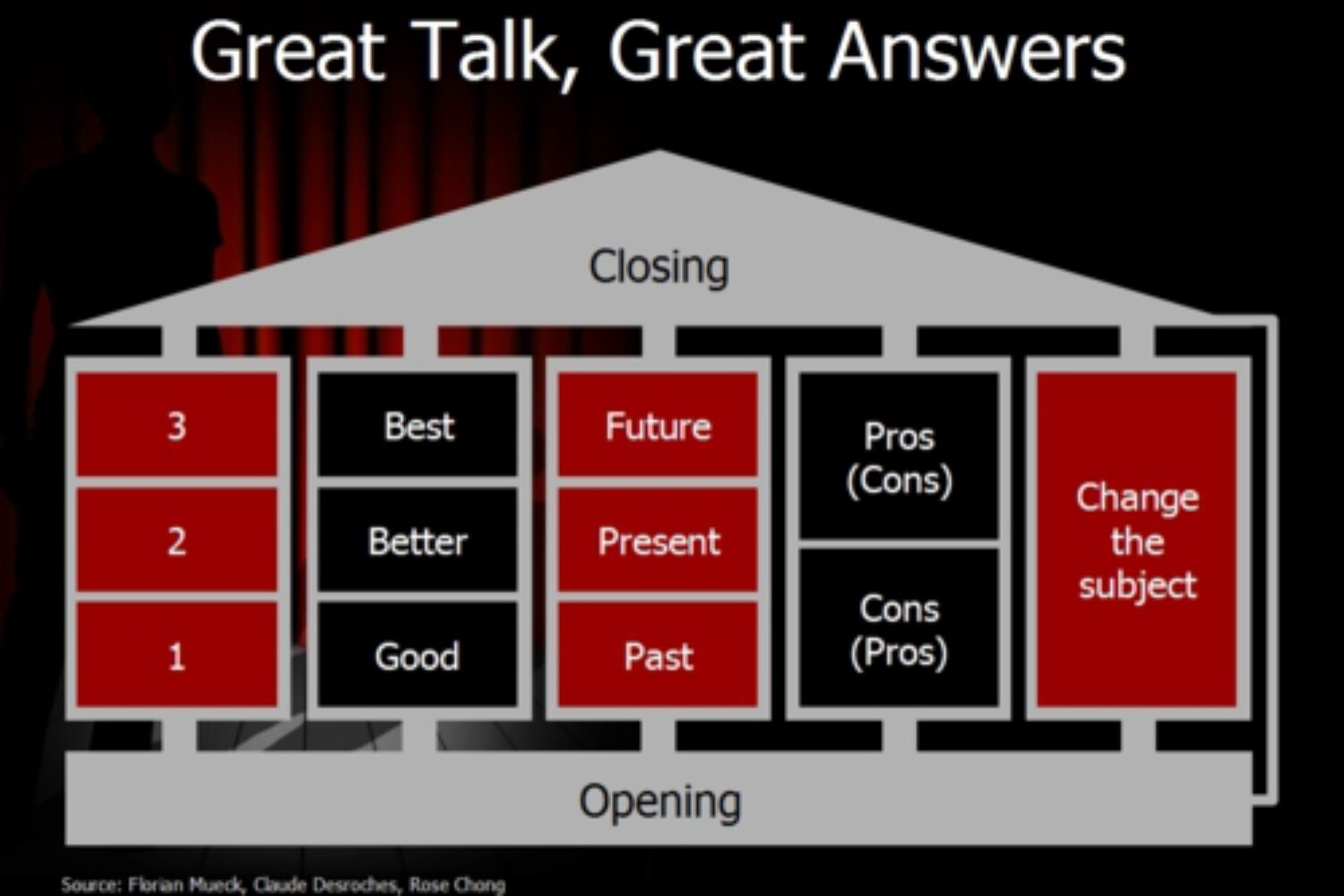Voltaire said, “Better is the enemy of good.” I don’t know if the second book will be better than the first one. You, the reader, will have to decide. But – I do know that the successor of The Seven Minute Star will be called #TheNetworker – Practical Networking Tips for Non-Americans.
Today I share with you a sneak preview of the script.
Great Talk, Great Answers will be a chapter of the “Networking Strategies” block.

In random conversations with people you meet – aren’t you frustrated to hear answers like “I don’t know” or “I’m not really sure if I can tell you that” or “I don’t know what to say”. How creative, how emotional, how passionate is that?
You are likely to hear such answers every time you ask a question which is not superficial.
I usually approach my small talk partners with the question, “What is your passion in life?” When they say that they don’t know I tend to excuse myself and get myself a strong drink. How can people possibly not know what they are passionate about? I hope you do.
Personally, I’m not a friend of small talk. I prefer Great Talk. Great Talk is one of the most promising baits you have in the networking game. It makes sure that people remember you when they go home, take out the 10 business cards they collected that night and go over the conversations they had.
There is nothing more dangerous to The Networker than being perceived as a dull talker. A crucial aspect of Great Talk is giving Great Answers. The question is: How can you give great spontaneous answers to questions such as, “What is your passion in life?”
The golden answer is: Structure.
A great friend of mine, Claude Desroches from Canada, has a passion in life! Apart from the question of what the next largest prime number greater than one billion is, you will never hear him say, “I don’t know.”
His passion is Toastmasters, the global network of public speaking clubs. As a long time member of Toastmasters Claude has learned a lot about impromptu speaking. Claude knows how to give Great Answers to literally any question.
My friend came up with a series of standard structures you can use to spice up your conversation and master the art of impromptu speaking.
I’d like to share my personal Top 5 with you – from more simple to more sophisticated structures:
- 1, 2, 3
- Good, Better, Best
- Past, Present, Future
- Pros & Cons
- Change the subject
Let’s go back to the initial question, “What is your passion in life?”, and see how you, The Networker, could give Great Answers.
1, 2, 3
The simplest way to giving an impromptu answer is to use the 1-2-3 structure.
You could respond,
“What is my passion in life? That’s a great question!”
Repeating the question plus acknowledging the questioner buys you time: to think, to structure, and to organize your answer.
“I guess, we all have several passions in life – our families, our friends, our hobbies. But – since you’re asking so specifically, I will share with you my three biggest passions in life. First, I love to talk. I know, I talk too much.”
Make fun of yourself. Self-deprecation shows others that you are comfortable in your own skin and that you can laugh at yourself, which usually puts them at ease.
“After five years with Toastmasters I turned my passion into my profession. Now, I’m a professional speaker. Second, I’m passionate about Europe. Ever since I did my Erasmus exchange program in Barcelona, I’ve been a fanatical promoter of the European ideal. Today, I’m promoting a European project called The Festival – One Week, One Europe. Third, my son Alvaro who just turned four. Love, passion, dedication. He brings out the best in me. Normally people ask me about my job first, but great! What about you?”
You throw the conversational ball back into their court. Now it’s not a ball. Now it’s a curve ball! This keeps the conversation alive.
Good, Better, Best
Using the Good-Better-Best approach allows you to include suspense and a climax in your answer. Just like the 1-2-3 structure, this one can be used to answer almost any question.
“What I am passionate about in life? Wow, that’s a great question. Most of us are usually passionate about things we are good at. What am I good at? My friends say I’m a great cook.”
When you mention something good about yourself always add… “My friends/colleagues/wife/husband/partner/parents say…”. You transmit the same message, but you avoid being perceived as arrogant. Using edification will get you everywhere!
“Yes, I definitely enjoy the peace, tranquility and the creative side of cooking.
What I’m even better at, according to my wife (again using edification), is painting. She wants me to start selling my paintings. But – so far I’m content with experimenting. And best? My son always calls me the best daddy in the world. I know, I know, all children do this. There are so many best daddies on this planet. I can without a shadow of a doubt say that my biggest passion in life is my son. As I said, a great question. What are yours?”
Past, Present, Future
If you want to share some chronological information with a touch of vision, I recommend you use the Past-Present-Future structure.
Now your answer could follow a chronological stream…
“When you were nine years old – didn’t you want to be a firefighter or a cop? I guess, our passions change over time. When I was 12 years old and the rap scene grew strong in New York and elsewhere, I was an absolute fan of break dance. I was so passionate about it.
Today, my greatest passion is public speaking – believe it or not! I know, public speaking, one of the top five fears in life; but somehow I became addicted to it. Others collect postage stamps, I love to inspire audiences.
In the future, who knows? My partner recently joined Rotary International. I’m also a member. We talk a lot about going somewhere in the future to help people. There are so many places where every helping hand, head and heart is needed…”
Pros & Cons
A sophisticated way to add some reasoning to your answer is to follow the Pros & Cons structure. Depending on whether you are in favor of or against the subject at hand, you might turn to the Pros or Cons structure for your answer.
“My passions? Do you want to hear the official ones or also those I cannot publish on Times Square? A passion I may not be too proud of, but which is a real passion of mine is drinking beer. What can I say, I am from Bavaria – beer brewing country.”
Remember, The Networker is always transparent. Talk openly about your weaknesses and failures. You will build bridges of sympathy everywhere you go.
“A passion I am very proud of, on the other hand, is my friends. I always try to keep the contact alive. I am there for them when they need me. I love to organize annual trips for my university crew. My friends are a great passion of mine. Of course, the benefit of these two passions is that I can combine them – I just love drinking beer with my friends!”
Change The Subject
Sometimes you have no intention nor any desire to answer a question. Then you can choose to change the subject or even the question. Politicians are super skilled at changing the subject in their answers. Have you ever heard any politician giving a precise answer to a specific question? Me neither!
“You don’t want to know my name? Nor what I’m doing? Cool. Have you seen the French movie ‘Amelie’? There is a scene in it where she lists all the things she does not like in life – like when the toilet seat is up.
Now – if you ask me about my passion in life, I’d rather tell you about what I do not like at all in life. I don’t dig pessimists. They are like black holes – sucking out all your positive energy. Stay away from them; very far away from them. I hope you are not a pessimist… Are you?”
You can change any topic. When they ask you about the greatness of New York, you answer that Copenhagen is a great city too and start talking about Denmark’s capital. When they ask you about the color red, you say that there are apples with a red and a green half and you begin philosophizing about the color green. Be creative, be like a politician! Have fun with it and let it show that you are enjoying yourself. It’s contagious.
Great Answers Trigger Great Conversations
Now – next time you have a random conversation with someone; don’t respond with boring standard phrases like “I don’t know” or “I’m not really sure if I can tell you that” or “I don’t know what to say”.
Instead, you will return a surprising answer. Be creative. Be emotional. Be passionate. You know: Great Answers trigger Great Conversations and Memorable Moments. Great Conversations lead straight into Great Contacts.
Great Contacts are your life line to becoming The Networker.
__________________________
Taken from the script of the upcoming book “#TheNetworker – Practical Networking Tips for Non-Americans”

